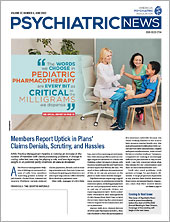As psychiatrists, researchers, and advocates working to untangle the sociopolitical underpinnings of inequities, it is essential that we center the experiences of Black, Hispanic, and other historically oppressed communities in our work. In this article, we will discuss data on the inequitable diagnosis and treatment of Black children with autism spectrum disorder (ASD) and intellectual and developmental disabilities.
Numerous studies demonstrate that White children are more likely to be diagnosed with ASD than Black, Hispanic, and Asian children. In the last two years, heightened attention to racial inequities and the factors that create and support those inequities have revealed how our implicit biases reinforce stereotypes that lead to errors in diagnosis. Black and Hispanic children are diagnosed later in life than White children. In a large cross-sectional study, half of Black parents reported visiting multiple health care professionals before their child received an ASD diagnosis, and 31.3% stated that the lack of available professionals contributed to this delay, according to a study by John N. Constantino, M.D., in the September 2020 Pediatrics.
Rather than being diagnosed with ASD, Black children are more likely to be diagnosed with intellectual developmental disorder. Researchers at Duke University found that in North Carolina the majority of students diagnosed with ASD were non-Hispanic Whites, while the majority of students diagnosed with intellectual developmental disorder were non-Hispanic Blacks. Racial inequities seen in the overall cohort were consistent across urban and rural areas. Low resource availability was associated with higher probabilities of a diagnosis of intellectual developmental disorder than ASD, according to studies by Eunsoo Timothy Kim and colleagues and Jill Howard, Ph.D., and colleagues.
This association is consistent with data from a national database indicating that the prevalence of ASD was higher among those of high socioeconomic status compared with those of low socioeconomic status for all races and ethnicities, according to a study by Maureen S. Durkin, Ph.D., and colleagues in the July 12, 2010, PLOS One.
While we should strive to address poverty, it is also essential to understand why inequities might linger when issues of access and poverty are eliminated. Stephanie Keeney Parks is a UCLA doctoral candidate and Robert Wood Johnson Health Policy Research Scholar whose work looks at how disability is experienced and understood within the Black community. Parks presented at APA’s 2021 Mental Health Services Conference, sharing two stories of upper-middle class Black families touched by ASD and intellectual developmental disorder. One vignette featured a Black family’s long-standing and evolving support for a family member with undiagnosed ASD and intellectual and developmental disability. The second example explored the experience of a mother, who is both a psychologist and an applied behavioral analysis therapist, and her young son with ASD. In these vignettes, Parks highlighted some of the negative consequences of an ASD diagnosis for a Black person as well as the numerous ways that Black families attend to their own needs, loving and caring for disabled loved ones with or without the use of biomedical standards and supports.
Without the work of medical anthropology, we miss essential contributors to inequity as well as sources of resiliency that can be identified by asking our patients. We encourage readers to learn more about their patients’ experience of being diagnosed and help create systems in which people of all races and ethnicities are supported and positively impacted by their encounters with the medical system.
The authors would like to recognize Stephanie Keeney Parks for the additional time she spent with them so that they could better understand her work.


